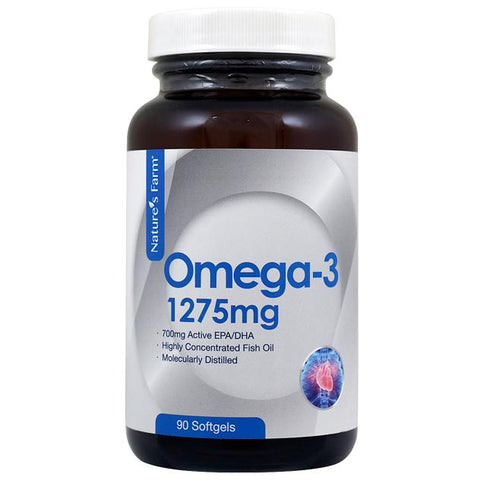
Is Fish Oil and Omega 3 the same thing?
- What is Fish Oil?
- Is Fish Oil and Omega-3 the same? Which should I take?
-
What are the Benefits of Fish Oil?
- 1. Lowers triglyceride levels
- 2. Makes your arteries more elastic
- 3. May help treat mental disorders
- 4. Improves eye health
- 5. May reduce inflammation
- 6. May help maintain healthy skin
- 7. Helps support pregnancy and early life
- 8. May help reduce liver fat
- 9. Increases attention span in children
- 10. Improves bone health
- 11. May help decrease the risk of allergies and asthma symptoms
- 12. Helps improve memory
- How can I get my omega-3 intake if I am vegan?
- How much fish oil should I take daily?
- What should I look out for when shopping for fish oil?
- What are the side effects of fish oil?
The term fish oil and omega-3 are used interchangeably and are often mistaken to be the same thing. We uncover the differences between the two and how it helps with our general health when included in our diet.
What is Fish Oil?
Most fish oil supplements in the market are extracted from the tissues of fatty fish through traditional methods such as wet pressing, or more technologically advanced methods through the use of enzymes. You may also consume fatty fishes such as tuna, mackerel, anchovies, and herring for your dose of fish oil.
Aside from the tissues, fish oil can also be derived from the liver of fish, in the case of cod liver oil. Fish oil is a primary source of omega-3 fatty acids; predominantly EPA (short for eicosapentaenoic acid) and DHA (short for docosahexaenoic acid). Vitamins A and D are found in fish oil as well.
Is Fish Oil and Omega-3 the same? Which should I take?
No, fish oil and omega-3 are not the same. However, they can be viewed as a duo as fish oil contains omega-3. Simply put, fish oil is the source, while omega-3 is the product.
When you consume fish oil supplements, you’re ingesting omega-3 too. 30% of fish oil consists of omega-3, while 70% are other kinds of fats. Omega-3 consists of ALA (alpha-lipoic acid), EPA, and DHA. Fish oil is considered a superior version of omega-3 as compared to those of plant origin because it contains EPA and DHA, the fatty acids our body needs.
Sources of omega-3 on land are ALA, a version that has been broken down by our body to produce EPA and DHA, which happens only in small amounts.
Other omega-3 sources with EPA and DHA include krill and phytoplankton. ALA, an omega-3 source found on land (important for vegans to note) are available in flaxseeds, walnuts, and dark leafy greens.
When fish oil is processed to become supplements, the concentration of EPA and DHA varies from 8% to 80%. Therefore, it is crucial to read the supplement labels and content before making a purchase.
In terms of fish oil or omega-3 supplements, we would suggest reading the label and purchasing one that contains both EPA and DHA as they are essential nutrients. If you are a vegan, then you can consider taking omega-3 that contains ALA, sourced from vegetation instead of oily fish.
What are the Benefits of Fish Oil?
Like all natural supplements, fish oil has its own list of health benefits. Discover more below:
1. Lowers triglyceride levels
The idea that fish oil lowers cholesterol is a common misconception; it lowers triglycerides, a different type of fat. Triglycerides store unused calories and provide energy to the body. Cholesterols are needed to build cells and certain hormones.
Having elevated triglycerides can harden the arterial wall, increasing the risk of stroke, heart attack, and other heart diseases.
A study by the Science Advisory found that four grams of prescribed omega-3 can lower triglyceride levels by 20% to 30% in most people.
2. Makes your arteries more elastic
A study was conducted on middle-aged volunteers with high levels of cholesterol to test the elasticity of their arteries after being supplemented with EPA, DHA, and a placebo.
There were no changes in the placebo group after seven weeks, but the artery elasticity improved by 36% in those who took EPA and 27% in those who took DHA.
3. May help treat mental disorders
A literature data review discovered that omega-3 seems to be useful in aiding mental disorders. It improved depressive symptoms and bipolar depression. Aggressive and impulsive behaviours showed encouraging results after being treated with omega-3, though the more in-depth study has to be done.
It is generally agreed upon that omega-3 (primarily EPA and DHA) can be considered as a naturally-derived and well-tolerated therapeutic tool.
4. Improves eye health
DHA is a vital structural component of your retina. Lack of omega-3 can cause eye muscle degeneration, leading to blindness and permanent eye damage.
Clinical research on omega-3 stated that available studies have only scratched the surface with regards to its primary and secondary prevention of eye diseases.

5. May reduce inflammation
Inflammation occurs as a natural response to fight infection. In some cases, chronic inflammation can occur, often caused by sensitivity, autoimmune disorders or long term infection. If left untreated, inflamed areas can lead to other diseases or health problems.
Omega-3 can reduce inflammation by stopping the production of inflammatory molecules.
A focused research conducted on obese pregnant women more at risk of inflammation found that Omega 3 supplements decreased inflammation by changing the composition of the cell membrane that helps with an anti-inflammatory cascade.
6. May help maintain healthy skin
Omega-3 fatty acids maintain the health of our cell membranes. Consuming sufficient omega-3 helps cells hold on to moisture more efficiently, protecting skin hydration, making it supple and soft. The plumping of the skin will also help diminish wrinkles.
7. Helps support pregnancy and early life
Studies have shown that pregnant mothers who consume Omega 3 supplements give birth to children with better social skills, better eyesight, higher intelligence and fewer behavioral problems.

8. May help reduce liver fat
Non-alcoholic fatty liver disease, more known as fatty liver, is a common disorder referring to those who drink little to no alcohol but have an accumulation of excess fat in the liver. Omega-3 can optimise the liver enzymes to slow the progress of fatty liver.
9. Increases attention span in children
Have you ever watched an advertisement on formula milk powders? There is always mention of DHA.
Studies have shown that DHA may initiate brain changes that improve attention, learning and behaviour in children, though it is less obvious in already-healthy children.

10. Improves bone health
Bone health is particularly crucial among astronauts as their bone density slowly depletes while in space (thanks to the absence of gravity). Hence, NASA has sponsored a study that found omega-3 fatty acids to be pivotal in mitigating bone breakdown.
It helps by boosting the amount of calcium in the bones, improving bone strength, reducing the risk of osteoporosis that is prevalent among the aged.
11. May help decrease the risk of allergies and asthma symptoms
Taking fish oil (high in omega-3) during pregnancy may reduce the chances of the child developing allergies to food and atopic dermatitis. Providing the unborn with these essential fatty acids will help curb the possibility of developing other symptoms like wheezing and even asthma later on.
12. Helps improve memory
We know what DHA does with the brain in young children, but did you know it also helps repair damaged brain cells in older folks?
As proteins and hormone compounds start to dwindle as age catches up, the brain is not so efficient in repairing itself, leading to age-related memory loss. Omega 3 improves blood circulation and increases the production of hormones and proteins, improving memory-loss conditions.
What are the side effects of fish oil?
When taken according to the dosage, fish oil has no side effects that endanger your wellbeing. The only issue you’d have is the fishy aftertaste that is not very pleasant. But here are some possible side effects that may occur:
- Indigestion
- Nausea
- Diarrhea
- Rashes
Also, consult your doctor for any interactions fish oil may bring if you’re taking certain medications like anticoagulants (drugs that slow down the blood clotting process), blood pressure medications, and contraceptives.
How can I get my omega-3 intake if I am vegan?
If you are vegan, you can consume ALA that is abundant on-land vegetation such as chia seeds, flaxseeds, hemp seeds, walnuts, and leafy green vegetables. Our bodies make EPA and DHA from ALA, but you should note that the conversion rate is very low - as little as 1% to 10%. If you are looking at getting enough DHA and EPA, consider algal oil. A study showed that it has the same nutritional DHA found in salmon. You can also choose to consume more seaweed like nori and wakame (found abundantly in Japanese food).
How much fish oil should I take daily?
When it comes to fish oil, you must look at the type of omega-3 present in the supplement and its dosage. The amount to take also largely depends on whether you have any underlying health conditions.
If you have high levels of triglycerides in the blood, 3.5 grams of omega-3 is the daily recommended dose.
If you are pregnant, you can consume a maximum of five grams of fish oil with a ratio of 1:5 EPA: DHA.
For those suffering from attention deficit-hyperactivity disorder (ADHD), 400mg of fish oil is sufficient.
For those who suffer from bad menstrual cramps, 500 to 2500mg of fish oil is the recommended daily dosage.
For those who have high blood pressure 4 to 15 grams of fish oil is recommended.
If you have weak and brittle bones with the risk of osteoporosis, 2000mg of fish oil is recommended.
What should I look out for when shopping for fish oil?
Before you buy any Omega 3 supplements, check the ingredients list. If you buy a 1000mg fish oil, it does not mean that it contains 1000mg of DHA, for example. If you check the label, there is usually 300mg of EPA and DHA combined.
The recommended dosage for Omega 3 is 250 to 500mg of combined EPA and DHA each day for healthy adults.

We recommend Nature’s Farm® Omega-3 1275 90s sourced from deep, cold-water fish. In a 1000mg soft gel, there are 180mg of EPA and 120mg of DHA. Take two to three soft gels a day, and your Omega 3 quota for the day is complete!
Taking omega-3 supplements sourced from fatty fish is one of the basic supplements for general wellbeing. For results, it is encouraged that you take them religiously. Within a few weeks, you might see changes in your skin texture, emotional wellness, and even your concentration levels. Have you gotten your omega-3 supplement yet?
References
Arterburn, Linda M., et al. “Algal-Oil Capsules and Cooked Salmon: Nutritionally Equivalent Sources of Docosahexaenoic Acid.” Journal of the American Dietetic Association, vol. 108, no. 7, 1 July 2008, pp. 1204–1209, www.sciencedirect.com/science/article/abs/pii/S0002822308005129, 10.1016/j.jada.2008.04.020. Accessed 6 Aug. 2020.
Bonilla-Méndez, Jeimmy Rocío, et al. “Methods of Extraction Refining and Concentration of Fish Oil as a Source of Omega-3 Fatty Acids.” Ciencia y Tecnología Agropecuaria, vol. 19, no. 3, 1 Dec. 2018, pp. 645–668, www.scielo.org.co/scielo.php?script=sci_arttext&pid=S0122-87062018000300645, 10.21930/rcta.vol19_num2_art:684. Accessed 5 Aug. 2020.
Bouchez, Colette. “Want Healthy Skin? Feed It Well.” WebMD, www.webmd.com/beauty/features/want-healthy-skin-feed-well#1. Accessed 6 Aug. 2020.
Bozzatello, Paola, et al. “Supplementation with Omega-3 Fatty Acids in Psychiatric Disorders: A Review of Literature Data.” Journal of Clinical Medicine, vol. 5, no. 8, Aug. 2016, p. 67, www.ncbi.nlm.nih.gov/pubmed/27472373, 10.3390/jcm5080067. Accessed 6 Aug. 2020.
“Can Triglycerides Affect My Heart Health?” Mayo Clinic, 2018, www.mayoclinic.org/diseases-conditions/high-blood-cholesterol/in-depth/triglycerides/art-20048186. Accessed 6 Aug. 2020.
“Fish Oil.” Mayo Clinic, 2017, www.mayoclinic.org/drugs-supplements-fish-oil/art-20364810. Accessed 6 Aug. 2020.
“Fish Oil: Uses, Side Effects, Interactions, Dosage, and Warning.” Webmd.Com, 2019, www.webmd.com/vitamins/ai/ingredientmono-993/fish-oil. Accessed 6 Aug. 2020.
Frank, Kurtis, et al. “Fish Oil Research Analysis.” Examine.Com, 15 June 2020, examine.com/supplements/fish-oil/. Accessed 5 Aug. 2020.
Freydis Hjalmarsdottir, MS. “17 Science-Based Benefits of Omega-3 Fatty Acids.” Healthline, Healthline Media, 15 Oct. 2018, www.healthline.com/nutrition/17-health-benefits-of-omega-3. Accessed 6 Aug. 2020.
Gordon, Serena. “Fish Oil May Help Arteries Stay Elastic.” Chicagotribune.Com, 4 Aug. 2002, www.chicagotribune.com/news/ct-xpm-2002-08-04-0208040336-story.html. Accessed 5 Aug. 2020.
Haghiac, Maricela, et al. “Dietary Omega-3 Fatty Acid Supplementation Reduces Inflammation in Obese Pregnant Women: A Randomized Double-Blind Controlled Clinical Trial.” PLOS ONE, vol. 10, no. 9, 4 Sept. 2015, p. e0137309, 10.1371/journal.pone.0137309.
Hodge, W., et al. Effects of Omega-3 Fatty Acids on Eye Health: Summary. Www.Ncbi.Nlm.Nih.Gov, Agency for Healthcare Research and Quality (US), 1 July 2005, www.ncbi.nlm.nih.gov/books/NBK11888/. Accessed 6 Aug. 2020.
Kuratko, Connye, et al. “The Relationship of Docosahexaenoic Acid (DHA) with Learning and Behavior in Healthy Children: A Review.” Nutrients, vol. 5, no. 7, 19 July 2013, pp. 2777–2810, 10.3390/nu5072777. Accessed 6 Aug. 2020.
Lu, Wenxia, et al. “Effects of Omega-3 Fatty Acid in Nonalcoholic Fatty Liver Disease: A Meta-Analysis.” Gastroenterology Research and Practice, vol. 2016, 2016, pp. 1–11, 10.1155/2016/1459790. Accessed 6 Aug. 2020.
“Omega 3: What Every Vegan Should Know.” Www.Veganfoodandliving.Com, www.veganfoodandliving.com/vegan-diet/vegan-nutrition/omega-3-what-every-vegan-should-know/. Accessed 5 Aug. 2020.
Optimega. “How Omega-3 Fatty Acids Can Help Fight Memory Loss.” Www.Prnewswire.Com, 28 Jan. 2020, www.prnewswire.com/news-releases/how-omega-3-fatty-acids-can-help-fight-memory-loss-300994277.html. Accessed 5 Aug. 2020.
“Prescription Omega-3 Medications Work for High Triglycerides, Advisory Says.” Www.Heart.Org, 2019, www.heart.org/en/news/2019/08/19/prescription-omega3-medications-work-for-high-triglycerides-advisory-says.
“Q&A: Are Fish Oil and Omega-3s the Same Thing?” Www.Consumerreports.Org, 6 May 2008, www.consumerreports.org/cro/news/2008/05/q-a-are-fish-oil-and-omega-3s-the-same-thing/index.htm. Accessed 5 Aug. 2020.
Ruairi Robertson, PhD. “13 Benefits of Taking Fish Oil.” Healthline, Healthline Media, 18 Dec. 2018, www.healthline.com/nutrition/13-benefits-of-fish-oil. Accessed 6 Aug. 2020.
Skulas-Ray, Ann C., et al. “Omega-3 Fatty Acids for the Management of Hypertriglyceridemia: A Science Advisory From the American Heart Association.” Circulation, vol. 140, no. 12, 17 Sept. 2019, 10.1161/cir.0000000000000709. Accessed 19 Sept. 2019.
“What Is the Difference Between Fish Oil and Omega-3?” Norway Omega3, 10 Feb. 2020, norwayomega.com/blog/difference-between-fish-oil-and-omega-3/. Accessed 5 Aug. 2020.


Leave a comment